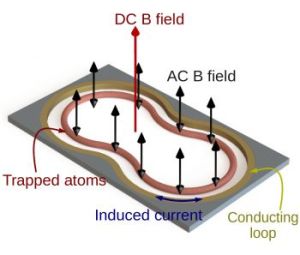Oct 29 2014
A solution to one of the key challenges in the development of quantum technologies has been proposed by University of Sussex physicists.
 Shaped atom-chip microtrap comprised of a conducting loop (gold) in which currents are induced in the same way as a transformer.
Shaped atom-chip microtrap comprised of a conducting loop (gold) in which currents are induced in the same way as a transformer.
In a paper published today (28 October) in Nature Communications, Professor Barry Garraway and colleagues show how to make a new type of flexibly designed microscopic trap for atoms.
Quantum technology devices, such as high-precision sensors and specialised superfast computers, often depend on harnessing the delicate interaction of atoms. However, the methods for trapping these tiny particles are hugely problematic because of the atoms’ tendency to interact with their immediate environment.
The Sussex team, in collaboration with the University of Strathclyde, have now shown that a new technique involving electromagnetic induction could be the solution.
Professor Garraway says: “Our findings are significant because future quantum technologies will depend on confining and manipulating cold atoms. The design of those traps is normally extremely complex and involves stringent requirements for scale and smoothness. Our new approach is simple to implement using a chip-based technology, which is flexible and very robust.
“This is another step towards the development of new quantum technologies that will revolutionise many aspects of our lives. Already, our researchers in Atomic, Molecular and Optical Physics (AMO) are developing devices that could radically change how we measure time, navigate our world, sense our gravitational field and solve seemingly impossible mathematical problems.”
Source: http://www.sussex.ac.uk/